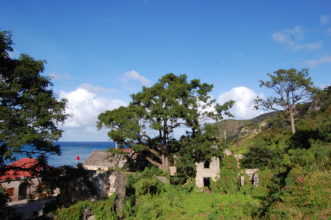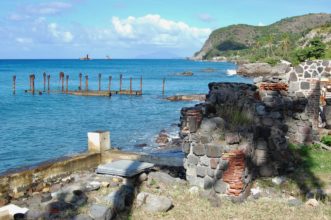When in the spring of 1775 the first shots sounded in the American War of Independence – as it would later be known -, neither party was prepared for a prolonged struggle. Washington’s Continental Army faced many problems. His army was not only smaller, but in need of everything, especially weapons and gunpowder. So when Captain Robinson set sail on the Andrew Doria from Philadelphia in October 1776, his instructions were to sail to the Dutch island of St. Eustatius and bring back any and all supplies you can lay your hands on.
The British navy did everything in its power to prevent supplies from reaching the insurgents. Both the Dutch Republic and France were only too happy to provide the necessary war-material for the British settlers, though their motives differed. For the Dutch, selling arms and gunpowder to whoever wanted them was simply a pragmatic matter of supply and demand. The French, on the other hand, were primarily interested in weakening the enemy.
Bustling free port
But transport by ship from Europe directly to the east coast of America soon became too risky. The solution was to let the shipments make a detour via the Dutch island of St. Eustatius. The French colony of Martinique was used for the same purpose. The cargo was picked up there by American ships.
At the time St. Eustatius was already a bustling free port where merchants from all nationalities met to do business, hence the nickname The Golden Rock. Walking through the now almost deserted Lower Town you can still see the ruins of the warehouses and shops that once stretched over a distance of nearly two kilometers along the coast. A visitor wrote in 1775: ‘It were endless to enumerate the variety of merchandize in such a place, for in every store you find everything.’

All trade, legal and illegal
The island acquired this position thanks to its strategic location and the monopoly the other powers – Great Britain, France, Spain – maintained on the traffic with their colonies. As a consequence, the British, French and Spanish possessions in the region were not allowed to trade directly with each other. The Dutch, however, traded with everybody. The Dutch West-India Company therefore saw the opportunity to create a neutral free port, open to all ships and to all trade, legal and illegal. The island offered a range of services, including the reflagging of ships, the repackaging of goods and the ‘adjustment’ of freight lists to conceal the nature of the merchandise or its origins.
The war in Britain’s colonies in North America offered new opportunities. No more lucrative trade than the arms trade. In the eyes of the British government the selling of arms to the rebellious settlers was a hostile act, but the profits outweighed the risks. In an attempt to secure the delivery of the badly needed supplies, the Continental Congress in the fall of 1775 ordered the foundation of what was to become the US Navy. The Andrew Doria was one of the first ships to be put into service.

Double-dealing Dutch
The salute the warship received in St. Eustatius strengthened the morale of the insurgents, but the British government became more convinced than ever that the Dutch were double-dealing. That put both countries in an awkward position. The merchants in the Dutch Republic gambled on a victory for Washington’s army and already dreamed of the possibilities the American market offered. But they also knew that Holland, with its neglected fleet, could not win a war with Great Britain.
London in turn was eager to punish the Dutch for their support of the insurgents, but then England would lose its only ally – at least on paper – in Europe. Both countries tried to avert a war without making concessions. In the aftermath of the ‘first salute’ the Dutch authorities kept the British at bay by promising an investigation into the behavior of the governor of St. Eustatius. The British government finally lost the momentum and had little choice but to wait for the next chance to teach the Dutch a lesson.
Next week part 3: How America was lost at St. Eustatius
Journalist Willem de Bruin worked for most of his career at the Dutch daily newspaper De Volkskrant, as editor of the news section and later of the op-ed page where he was responsible for the daily editorial. He wrote essays for various sections of the newspaper on both domestic and international topics. He left the newspaper in 2011 to write books on history.




